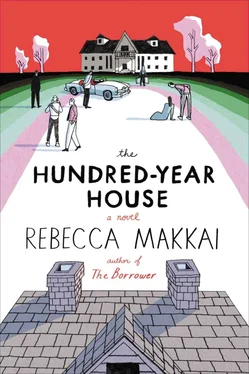Josephine laughed — a nervous burst.
It happened again: hard and fast, on the roof — the dining room did stick out from the rest of the house — and trailed off as if it wanted them all to follow somewhere.
Devohr scanned their faces, blinking his little eyes again and again.
Marceline wondered if this was the misfiring of some effect they’d arranged for Devohr’s benefit — akin to all the fireworks shooting off at once, before the grand finale. She perceived nothing but confusion all around her, though, and concern. Fannie and Josephine grabbed each other’s hands.
Samantha said, finally, “It’s the acorns. They’re early this year.”
So it hadn’t been the plan. What had been the plan? Zilla was to have spoken. But she just sat there, ashen, the only one not laughing now, the only one who didn’t seem relieved, and whispered into her cupped hands: “Good lord.”
Marceline had simply been told to flirt, and this she had done expertly. The high art of pantomime — quite possibly her last performance of that art. She was unfortunately hazy on other details. But she could flirt till dawn.
Mr. Devohr stretched and stood. “We should end this soirée. I’ll be heading back to Chicago quite early in the morning.”
Samantha said, “We’re finished.” But it was a question, and they all knew she wasn’t referring to dinner.
He sniffed. “You’ve had a good run, Miss Mays. I always say, it’s important to recognize when the party’s over. There’s a fine art to it.”
Armand said, out loud: “What in the hell do you know about art ?”
Marceline thought for a moment they might all erupt into violence or weeping. Instead the energy slowly left the room. A leak in the balloon.
Zilla should have taken over now, but she was still glazed, still spooked.
Marlon finally spoke. “Well, what happened to the booze? If we’re giving up here, can we at least make a good night of it?” The poor man. He was twitching, positively twitching. Marlon hadn’t been in on the plan — he’d spent the afternoon sobering up, not rehearsing — but he’d inadvertently cut to the chase, skipping over Zilla’s forgotten invitation to visit the studios, skipping the slow progression that would lead them all to a nightcap and then another and another. Which would all lead, somehow or other, to Gamby Devohr’s heart.
“He’s only joking, Mr. Devohr,” Fannie said. “We don’t drink a drop here!” Marceline supposed this was part of the script, a displaced line. She felt herself back on a rooftop in Fort Lee, those embarrassing summer flickers of twenty years past, costumes pulled from theater trash, directors who’d never directed so much as bicycle traffic. Devohr was about to laugh. Marceline — finally she knew exactly what to do — Marceline stood up next to him and slid her hand down the outside of his thigh. She cocked her head and let her eyelashes fall slowly down. “Please do join us for a drink,” she said. “For a last bacchanal. How often, back in Canada, do you live like the artists do? The night is terribly young.” And she could see in his dopey eyes the affirmation of what she’d learned on her very first picture: Sex trumps a poor script and poor players any day.
Marceline walked with him, arm in arm, trailing Zilla and Samantha and Armand back to the director’s house and up the stairs. Marlon followed at a distance, apparently even less sure than Marceline of what was happening. Alfie circled their feet. They found Eddie alone at the little kitchen table, his finger to his lips. The girl, he said, was in bed.
Samantha got a hammer from under the sink and, turning it to the prong end, began prying the nails loose from the ugly square board behind her. Marceline kept Devohr talking and laughing while Armand took a turn, and then Eddie. The board broke loose from the wall, and then there was a great clatter as Eddie and Armand reached in and pulled out an improbable number of liquor bottles.
Marceline guessed from the proximity of the hammer, from the loose way the board was nailed, that this unveiling had been part of the plan all along. If Devohr thought they were letting their guard down — if he thought they’d given up entirely and were revealing their true selves — he’d maybe let his guard down, too.
Armand said, “The terrace! I’ll bring cigars!”
Eddie stayed behind to make sure the child was asleep. Marceline pulled Devohr by the hand — down the stairs, down the walk that circled behind the big house. The sun was still bright and high. When she was sure he’d been propelled in the right direction, she let go and fell back with Zilla and Armand, five bottles between them, the dog at their heels.
“How does the plan go now?”
“That was the plan. That’s as far as it goes.”
More acorns covered the ground than should have been possible. The oaks all grew in front of the house — the smaller ones off to the left, the majestic one between the director’s house and the big house — but even so their helmeted seeds carpeted the lawn and terrace and paths out back like hail. Green still, and dangerous: Josephine went rolling forward, and Fannie caught her under the arms. “They’re good luck!” Marlon said.
“Well, we need plenty of that.”
Hazy and hot, the air still and heavy.
Viktor said, “Shall we build a fire? Back on the pile?”
“Oh, yes, yes!” Fannie said.
Everyone made it to the terrace. Even Ludo, with nothing more to lose, came down from the attic to slap Gamby on the back and say he’d teach him to drink like an Italian.
Armand took over one of the long, high tables and started mixing drinks. Someone broke into the kitchen and brought out lemons, and soon Armand was squeezing them into a glass and picking out seeds with his fingers so he could mix the juice with the gin and the precious Cointreau to make White Ladies. (“How ghostly!” Josephine cried, and Fannie rubbed her hands together. “Ooh, shall we bring out the Ouija? It’s still in the library!”)
Gamby said, “You don’t believe in ghosts, do you? Tell me this. Why’d they all die violently? Where’s the ghost of the nice old lady who died in bed from a tumor?”
“Resting in peace! It’s energy that makes a ghost, unfulfilled energy. Anger, or fear, or — or—”
“Love,” Josephine said. “Unrequited love.”
Armand said, “There are more things in heaven and earth, Mr. Devohr, than are dreamt of in your philosophy.”
Marlon and Viktor decided they were in charge of the bonfire. Marlon slipped his smoking jacket back on and ran around gathering extra sticks, while Alfie the dog scampered after in joyful brotherhood. Viktor became convinced the quality of the fire would depend on the number of matches used to light it, and took donations from the men’s pockets.
Marceline and Zilla reclined on the terrace wall, legs stretched along it toward each other. Sylphic bookends. Samantha put a chair for Gamby right in front of them, at eye level with the legs. And she sat too, and she asked Ludo to open the solarium windows and turn on the Victrola. Soon there was music, “A Shady Tree” and “Was It a Dream,” and soon Ludo was back and handing out Armand’s cigars, and Armand was passing drinks. Marceline said, “I vent to such a lofely garden party last month, at the house of Mary Pickford. Mister Devohr, do you know her films?”
“Heavens, yes!”
She lowered her voice. “And I vill tell you the real reason she cut her hair.”
Behind them, Josephine leaned against the ivy, and Fannie leaned against her, on her soft shoulder. She said, “What would we do without this place? What sort of world would this be, without refuges?”
Читать дальше












